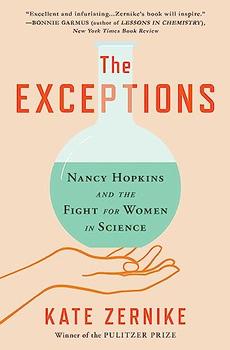Summary | Excerpt | Reading Guide | Reviews | Beyond the Book | Readalikes | Genres & Themes | Author Bio

Nancy Hopkins, MIT, and the Fight for Women in Science
by Kate Zernike
Ann divided the men of Harvard into those who wore dark socks and those who wore white: the dark socks were worn by the boys who had gone to boarding or elite private schools, the white socks were worn by the boys from public schools, Bronx Science or Stuyvesant if they were lucky. These white-sock boys were becoming Nancy's friends in the lab, and she felt more at ease with them than she did the boys with dark socks. Science was becoming her social world, too.
The lab brought many famous visitors, none more eagerly anticipated than Francis Crick. Crick was twelve years older than Jim, and Jim revered him. Jim quoted him constantly, aped his confidence and his English intonations. ("Both young men are somewhat mad hatters who bubble over about their new structure in characteristic Cambridge style," a visitor from the Rockefeller Foundation to the lab wrote shortly after their discovery of the double helix. "It is hard to realize one of them is an American.") It was close to graduation in the spring of 1964, and Watson had planned a big party in his apartment on Appian Way in Crick's honor, inviting students along with some of Harvard's most prominent faculty. Nancy made a mental note not to drink too much; Watson served a potent cognac-and-wine punch, and she wanted to stay sober enough to have an intelligent conversation with Crick. She went to do some work in the lab early that afternoon in the hope she'd get the chance to meet him there first.
Francis Harry Compton Crick had grown up the son of a shoemaker in the British Midlands, but carried himself with the satisfaction of an aristocrat, a man used to being acclaimed as a genius, as almost everyone who knew him now did. He was tall, handsome in an imperious way, with a prominent nose and chin—a profile worthy of a coin—and an arch smile. Nancy would have recognized him from the photograph in Jim's office of the two men gazing at their six-foot model of the double helix, had she time. But Crick arrived so suddenly behind her in the little side lab that she realized he was there only because his hands were on her breasts.
"What are you working on?" he asked, his voice as loud as its reputation.
Nancy froze. Crick was married, and she had heard he was a womanizer; a former grad student from Watson's lab had told her that he knew a postdoc who had slept with him in England, that Crick's beautiful and cultured wife knew about his infidelities but looked the other way. But Nancy hadn't dwelled on the gossip, and she hadn't considered this would come to her. She'd heard similar rumors about Jim, and he had never made a move on her. She'd never even seen Jim with a date.
She wriggled on her lab stool to break free of Crick's clutch and stammered, trying to find a way to move the conversation onto science. She thought first that she didn't want to embarrass him, second that she didn't want to embarrass herself. She had to be able to face him that night.
She told him she was studying bacterial viruses but that she really wanted to study the repressor function of genes, though she realized that was too challenging a problem right now. She kept talking, holding out hope he would see her as a serious person.
Then just as suddenly, Jim burst through the door, clapped his hand on Crick's back to greet him, and steered him back into his office. Nancy was alone again. If Watson had seen anything, he didn't say so. Nancy went to the party that night and held her liquor. It was crowded, with dancing, as usual. Jim urged her to stay to the end, which she did, hanging on the small circle talking science around the famous duo. Then, because no Radcliffe girl would walk through Cambridge alone at one o'clock in the morning, Watson and Crick, purveyors of the secret of life, the great men who generations of biology students would know by their conjoined surnames, escorted her along the brick sidewalks of Garden Street and back to her dorm.
Excerpted from The Exceptions by Kate Zernike. Copyright © 2023 by Kate Zernike. Excerpted by permission of Scribner. All rights reserved. No part of this excerpt may be reproduced or reprinted without permission in writing from the publisher.
Your guide toexceptional books
BookBrowse seeks out and recommends the best in contemporary fiction and nonfiction—books that not only engage and entertain but also deepen our understanding of ourselves and the world around us.